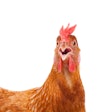
Gregory emphasized that producers need to decide in 30 to 60 days whether or not they actually need the permit that will be required in the final rule. There are still some aspects of the rule that are undetermined as to whether or not a producer will be required to have a permit, which relates to discharge. Most producers do not discharge, and according to Gregory, will not require a permit.
The air quality study that the American Egg Board (AEB) is funding is expected to begin in March. There are three sitesWest, Midwest and East. UEP is trying to organize farm visits with the EPA prior to the start of the study. Gregory also reported that the issue of particulate matter is still not dead and the EPA is expected to clarify the language on it.
Not Just Exports
Roger Deffner, Marketing Committee Chairman, said that the $1.30-plus current egg price is not solely due to the export orders. On Dec. 1, bird numbers were the lowest since 2003, he noted. Some of this is due to the supply side action that was taken prior to Christmas. He also said that feed prices have soared due to the ethanol demand. Corn could rise to $5.50/bu. and dramatically continue to impact the cost of producing eggs.
Deffner reminded the group that methods of price discovery have not been updated since 1974 and that with costs going through the roof, new formulas should be instituted. On exports, he said that 34 more container loads of eggs will be shipped by United States Egg Marketers, and urged that more producers join the organization.
Government Relations Chairman Ron Truex reported first on Salmonella. He said that because there is a lower incidence rate of Salmonella on egg farms, it is not necessary for the U.S. Food and Drug Administration to visit them. Motions were made and passed to appoint board members to coordinate UEP's position on the renewable energy issues and to form a committee with other livestock groups for a summit to discuss the ethanol situation and its impact on production costs. Board members said that forming a summit committee with other livestock groups would be the strongest way to approach the problem and create a document that could be presented to the U.S. government.
On the animal welfare front, Animal Welfare Audit Subcommittee Chairman Mike Bynum said the audits for 2007 will begin soon. A letter from Cal-Maine Foods that outlines the company's basic principles for managing the UEP Animal Welfare Program was discussed. The program is basically using the seven principles of HACCP incorporated into the UEP guidelines. Mitch Head of Golin and Harris Public Relations Co. presented their program for 2007. Efforts will include several national forums relating to animal welfare. Culinary, grocers, food marketers and food service organizations will also be included in the agency's work to counter the activities of activists. This will include advertising in food related publications.
Another animal welfare issue was discussed that the Board of Director's addressed. A small group of producers that have not participated in UEP's Certified Program have proposed another plan to USDA which does not include the 100% rule. The group is seeking an audit from the Agricultural Marketing Service called a Process Verified Program (PVP).
Animal Welfare Audits
At the Board meeting, UEP President Gene Gregory introduced a proposed letter from UEP to AMS with two points for them to consider with respect to any requests they may receive to audit PVPs or otherwise provide auditing services. The first is that any PVP producers must comply with 100% of their production instead of just having a partial number complying with the balance doing something different. The question was asked whether it would be misleading if only a portion of production was under the PVP audit. The second point made in the letter to AMS is that the standards for any PVP that make or imply claims about animal husbandry should be based on science. This includes molting methods, bird space, and the practice of back-filling. All these and many more requirements have been established through extensive scientific research and any deviation from them could lead to problems with the UEP program as well as any other. The Board approved the sending of this letter to AMS.
Dr. Maynard Hogberg from Iowa State University made a presentation to the board regarding the proposed formation of the Egg Industry Center. The proposal was originally made to the American Egg Board in November and invites the industry to establish the center at Iowa State University to strengthen coordination and leadership in university-based applied research, extension and education to address the needs of the American egg industry. The Iowa Egg Council has made a $1 million investment to support the center.
According to Hogberg, 12 land grant colleges with poultry programs have committed to the center. The center would identify and work on challenges to the industry using scientific approaches from the colleges that participate. Just a few of the challenges that have already been identified by leaders of the industry include bird health/infectious diseases, animal welfare, and emissions. Hogberg is seeking the endorsement of UEP and with it, he said it will confirm the national effort. Dr. Don McNamara, head of the Egg Nutrition Center, and who introduced Hogberg to the board, suggested that the center will foster more interest in poultry programs at the university level. The board, through a motion, endorsed the concept of the center and will see the progress made with the AEB March meeting. Further discussion will occur at the May UEP Legislative meeting.
Egg Nutrition
McNamara said several areas of research showing positive results include the fact that adding an egg to the diet each day has no negative consequences and has increased benefits with the over-70 population group. This means no additional cholesterol and a lower risk of heart disease. He also said that benefits to weight loss are shown with consumption of eggs. In addition, it is proven that children eating a good breakfast with eggs are doing better in school. The members of the ENC staff are very active with seminars and symposiums throughout the world. Dr. Hilary Thesmar, head of the Egg Safety Center is continuing her work on the avian influenza updates.
Several promotions were announced during the UEP meeting in addition to Gene Gregory becoming President. Howard MagWire is now the VP of Government Relations and Chad Gregory is Senior Vice President in charge of the environmental issues and representative to the International Egg Commission.


















